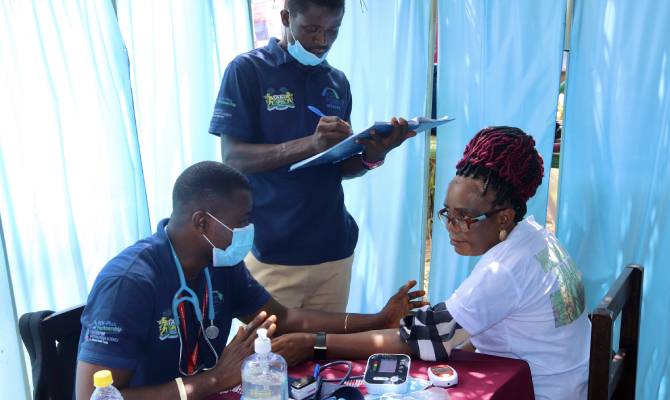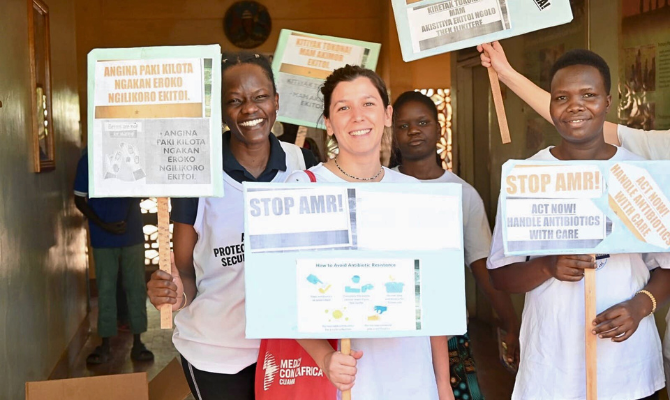About 422 million people worldwide have diabetes, the majority living in low-and middle-income countries, and 1.5 million deaths are directly attributed to diabetes each year. The Africa region, is expected to experience the highest increase in diabetes globally with the number of people suffering from the disease predicted to rise to 55 million by 2045.
Diagnosis, together with cost and access to treatment remain the main challenges for people living with diabetes in sub-Saharan Africa.
«People living with diabetes often ignore their status until serious complications arise. That’s because diabetes, as other non communicable diseases, can be silent therefore go unnoticed. – said Katunzi Muazema CUAMM specialized nurse in Tanzania. In recent years, however, an increasing number of people with chronic diseases have sought healthcare services because they know what NCDs are and can recognize their signs and symptoms. This is the result of our work that integrates activities at community level and provision of health services».
While noncommunicable diseases such as diabetes remain largely underfunded, in Tanzania, Sierra Leone and Mozambique CUAMM continues to be committed to ensuring that all people who are diagnosed with diabetes have access to equitable, comprehensive, affordable and quality treatment and care.
TANZANIA
In Tanzania NCDs including diabetes are responsible for 34% of all annual deaths, as reported by the World Health Organization (WHO). The increasing burden of NCDs in the Country is compounded by limited access to healthcare, inadequate health education, and insufficient prevention strategies, especially in rural and underserved communities. Understanding the knowledge, attitudes, and practices (KAP) of the population regarding NCDs is essential for developing targeted interventions and policies to combat this public health crisis. In this context, Doctors with Africa CUAMM is advancing its project “KNOW TO CURE: Fighting NCDs through Continuous Training of Personnel in Tanzania”. One of the main aims is to strengthen peripheral health facilities in the rural areas of the Iringa District Council.
The activities encompass: monthly clinical activities and on the job training in 9 health centres (HCs) in Iringa district; data collection and monitoring outcomes and follow-up at HCs level; annual training for health-care personnel of Iringa district; building training and supervision a network of peer supporters; drugs availability record to know the needs ofthe HCs and to correctly plan orders; kap survey to understand the needs and knowledge of rural population outside the HCs.
In Iringa District and at the Tosamaganga Hospital CUAMM’s work on NCDs proceeded in 2023, with the hospital acting as the district’s referral facility for the diagnosis and care of chronic patients and peripheral facilities supporting treatment and follow-up. In 2023 alone, we have performed 1.873 visits for diabetes and 79 hospitalization, plus 4.298 visits for hypertension.
SIERRA LEONE
The burden of non-communicable diseases (NCDs) in Sierra Leone has grown significantly in recent years. The MoHS recently adopted an “NCDs Strategic Plan 2020-2024”, which also reports NCDs contributing to 41% of mortality in the Country, corresponding to an estimated 29,700 related deaths every year. There are many reasons why the rate of NCDs is so high in the Country. Among others, a widespread lack of awareness among patients, regarding diseases and risk factors – particularly diabetes; a severe shortage of medicines, along with only 11% of public health facilities providing diabetes services and health inequities, with services available more in urban (34%) than in rural facilities (7%). Additionally, the country suffers from high rates of chronic childhood malnutrition (as well as pockets of severe malnutrition), which has been found to contribute to the development of NCDs in adulthood (Lancet Maternal and Child Nutrition Series, 2013).
In Pujehun district, we opened the PEN-Plus clinic for chronic non-communicable diseases a year ago. The opening, funded by the Brigham and Women’s Hospital and the NCDI Poverty Network, was the result of the collaboration with the Ministry of Health and Sanitation of Sierra Leone. The clinic provides diagnosis and treatment of patients mainly suffering from common chronic diseases, such as hypertension and type 2 diabetes, but also type 1 diabetes mellitus, sickle cell anaemia, asthma, chronic liver disease and epilepsy. Over the past year alone, we have performed 513 visits for diabetes and 1.143 for hypertension.
PEN-Plus is an integrated care delivery strategy focused on increasing accessibility and quality of services for type 1 diabetes (T1D), rheumatic heart disease (RHD), sickle cell disease (DCD) and other severe NCDs affecting poor rural and peri-urban communities in LMICs. PEN-Plus entails decentralizing lifesaving care services for severe NCDs (that are usually available only in referral hospitals) to first level rural hospitals, and equipping available mid-level providers – such as nurses, clinical officers and health officers – with the skills needed to provide integrated chronic care services including diagnosis, symptom management, and referral for surgical and other speciality care when needed. The PEN Plus strategy builds on the cost-effective WHO’s package of essential NCD interventions (PEN) for primary health care in low resource settings.
In addition, a intervention funded by World Diabetes Foundation (WDF) is being implemented by CUAMM in the districts of Pujehun and western area. Over the last 6 months, several activities have been conducted to strengthen early screening, referral and community education on diabetes and hypertension namely outreach screening with the active participation of the community members, including women’s leaders and education and sensitization through both dissemination of IEC materials and radio talks. As of the end of July 2024, such activity reached over 6.000 people during outreach screening, health facility visits and training of healthcare workers.
MOZAMBIQUE
In Mozambique, CUAMM continues to bolster its efforts to combat diabetes and non-communicable chronic diseases. In 2023, through the intervention funded by World Diabetes Foundation, we worked on diagnosing and treating type 1 diabetes in 5 hospitals located in the provinces of Sofala and Zambezia. As a result, an overall number of 344 visits for diabetes and 110 hospitalizations were performed.
This year CUAMM’s commitment to responding to NCDs including type 1 and type 2 diabetes, has expanded to the provinces of Maputo, Tete and Cabo Delgado therefore ensuring provision of care in 58 health facilities in 5 provinces thanks to the support of multiple partners, namely World Diabetes Foundation, AICS, PEN-Plus and Mass General Brigham and Women’s Hospital. According to the WHO Country Profile 2018, Mozambique reported 69,100 deaths due to non-communicable diseases (NCDs), an estimated 27% of all deaths in a population of 28,829,000 inhabitants. Mozambique has the highest proportion of undiagnosed diabetes (86.7%), followed by the United Republic of Tanzania (79.8%) and Tunisia (75.0%). Nationally, Mozambique’s prevalence is 2.4% among adults aged 20-79, and diabetes is responsible for the death of 9,485 individuals aged 20-59 and 635 children every year.
Every year more than 15 million people die prematurely from NCDs, with 85% of deaths occurring in low and middle- income countries (LMICs) (WHO, 2021). It has been estimated that chronic diseases will cause more deaths than communicable diseases by 2030, including in Africa. Additionally, chronic (especially co-morbid) patients are costlier to manage for health systems and suffer significant financial losses themselves due to inability to work for periods of time and costs they may incur to access and receive care. Accordingly, prevention and treatment of NCDs, including in LMICs, is comprised in the health-related targets of the Sustainable Development Goals (SDGs) Agenda.





